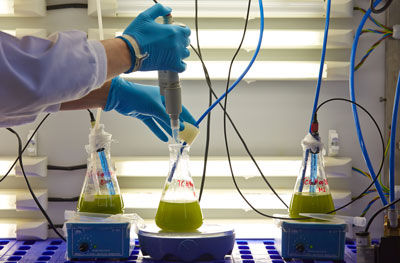Glycerine, the key molecule to obtain renewable bio-products within the biorefinery framework
In an innovative synthesis process developed by TECNALIA, the crude glycerine from the biodiesel production process is subjected to a series of purification and concentration pre-treatments to be turned into polyols and polyurethanes which will be used for the formulation of renewable hot-melt adhesives.
A leading institute from the footwear sector is checking the quality of the synthesised polyols and evaluating the interest in this renewable product.
Glycerine or glycerol, one of the most versatile products that exists, allows a wide range of by-products of industrial interest to be obtained. The current situation derived from the concepts of the Circular Economy, Bioeconomy and the comprehensive use of resources has led to a new momentum in the valuation of glycerol, bearing in mind the potential innovative uses beyond traditional ones in the chemical (synthesis of alkyd resin and polyurethanes), food, pharmaceutical, cosmetic, adhesives, paint and varnish and explosives industries, among others.
These developments are being carried out within the framework of CYCLALG, a circular economy and comprehensive microalgae biorefinery project, whose primary objective is to foster a cross-border biorefinery model based on heterotrophic microalgae.
 |
 |
CYCLALG has been co-financed to 65% by the European Regional Development Fund (FEDER) through the Interreg V-A Spain-France-Andorra programme (POCTEFA 2014-2020). The objective of POCTEFA is to reinforce the economic and social integration of the Spain-France-Andorra border area. Its assistance is focused on the development of cross-border economic, social and environmental activities through joint strategies in favour of sustainable territorial development.
Download the press release for this conference

